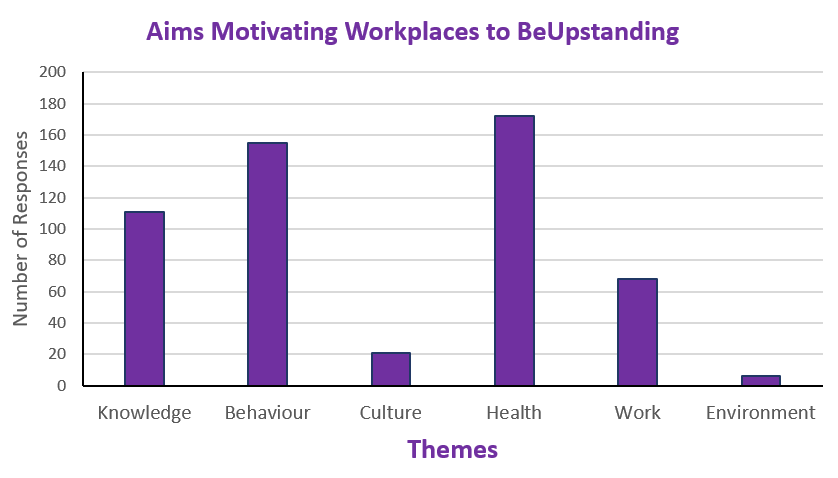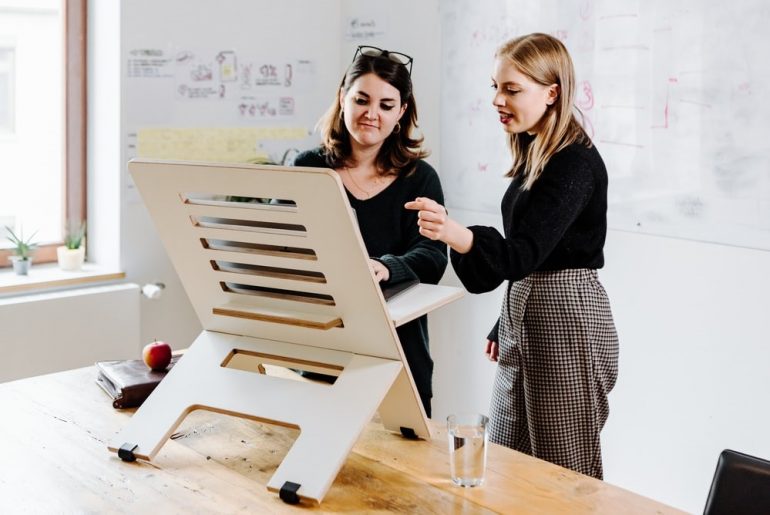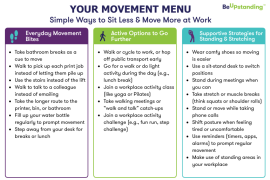The BeUpstanding program has just celebrated its 3rd birthday. Designed to support workers to sit less and move more for their health and wellbeing, the program has seen over 650 workplaces sign up and over 45,000 employees exposed to the sit less, move more messaging. But why do workplaces want to take part in BeUpstanding in the first place, or, more specifically, what do they aim to achieve by taking part? Now, thanks to the efforts of three UQ psychology students, we have been able to unpack just why work teams want to BeUpstanding. Their findings will be discussed in a series of blog articles. This first article examines health and behavioural aims and was written by Nicole Delmo, a UQ psychology honours student.

So, what did we do?
As part of the sign-up process for BeUpstanding, workplace champions are asked “What are you hoping to achieve by your work team taking part in BeUpstanding?”. This is an open text question, meaning that champions can write as much as they want in their response. We analysed 332 responses to this question using a process called ‘thematic analysis’. First, we independently identified the topics present in the responses and grouped them to create a list of overarching themes. We then came together to agree on a final list of themes to ensure the themes accurately represented the intent of the responses. Afterwards, we independently coded each response to the themes they applied to, with some responses applying to just one theme, while others applying to several themes. Once we finished our independent coding, we came together to resolve any coding discrepancies.
What did we find?
Six overarching themes were found: knowledge, behaviour, culture, health, work, and environmental change. As shown in the graph below, aims relating to health, behaviour, and knowledge were most common, while aims relating to work, culture, and environmental change were apparent but less common. This blog article will focus on the aims pertaining to the two most common themes, health and behaviour.

Theme 1 – Health
Health-related aims were most common, where workplaces expressed wanting “to improve the health and wellbeing of the team” as a result of participating in the BeUpstanding program. It is no surprise that health was a major focus since supporting workers to sit less and move more for their health and wellbeing is a key focus of the BeUpstanding program. Improving health is particularly important as it can impact both the individual and the workplace. There is a clear benefit to the individual that comes with improving health. There is also the potential of health improvements extending to workplace benefits by improving work performance and decreasing workers’ compensation claims. Most of the responses pertaining to this theme referred to wanting broad improvements in physical health, mental health, and general wellbeing. Some responses mentioned more specific mental and physical health aims.
[a] happier healthier workforce with decreased stress levels.
For physical health, there was a focus on wanting to reduce the risk of employees experiencing physical health issues that were common in the workplace. These reductions mainly consisted of reducing the risk of cardiovascular disease and “to help with musculoskeletal issues and improve happiness/wellbeing”. Mentions of more specific health aims sometimes accompanied the desire to prevent problems that the responder had experienced – “to help prevent others from experiencing similar back issues to myself.” – as well as to reduce the common health issues observed in the workplace and to “Reduce Workers Compensation Claims, increase physical activity and wellbeing”. Furthermore, improvements desired in health frequently accompanied an aim pertaining to work, such as improving cohesion and productivity. Generally, it appeared that improving health was a key aim for both individual and workplace gain.
better health outcomes for the individuals, but greater productivity from the team

Theme 2 – Behaviour
Behaviour-related aims were the second most common theme, where workplace champions flagged aims around “Getting people more active”. This prevalence may also not come as a surprise as changing behaviour is the key pathway through which BeUpstanding aims to improve health. Changing workplace behaviour may be particularly important as the behaviour of our colleagues can often influence how we behave. If it is normal for everyone in your workplace to be sitting at their desk for long periods of time, it may come across as weird or unproductive if you go for regular walks or stand up at your desk. This perception may deter you from partaking in healthy behaviours and may instead encourage you to continue behaviours which are detrimental for your health just because it is the norm, like sitting for long periods of time. Our behaviours have been suggested to be largely influenced by social factors. Because of this influence, addressing workplace behaviours may be important when trying to achieve other goals like improving health and work performance. Most of the responses pertaining to this theme simply expressed the desire to increase workplace activity, with some mention of increasing the use of workplace equipment.
Use the standing desks I bought more effectively!”
However, a portion of responses coupled an aim to change behaviour with an aim related to health and/or work. These health and work related aims included just broad improvements to health and work, to more specific aims like reducing injuries and stress, and improving productivity, engagement, and cohesion.
We become physically more active and work as a team”
Summary
Overall, it appears that changing behaviour may be how workplaces might achieve other aims. It was great to see how the aims of the workplace champions were strongly aligned with the aims of the BeUpstanding program. Stay tuned for our next few blog articles where we explore the other themes and how it all connects.
This blog article was written by Nicole Delmo as part of her placement with the UQ BeUpstanding team. The work reported in this article was completed by Nicole Delmo, Gilbert Leung, and Jade Lim. Nicole is a psychology honours student at The University of Queensland and is interested in mental health and human performance. She is particularly interested in strategies to improve resilience and occupational performance.
![]()










Comments are closed.